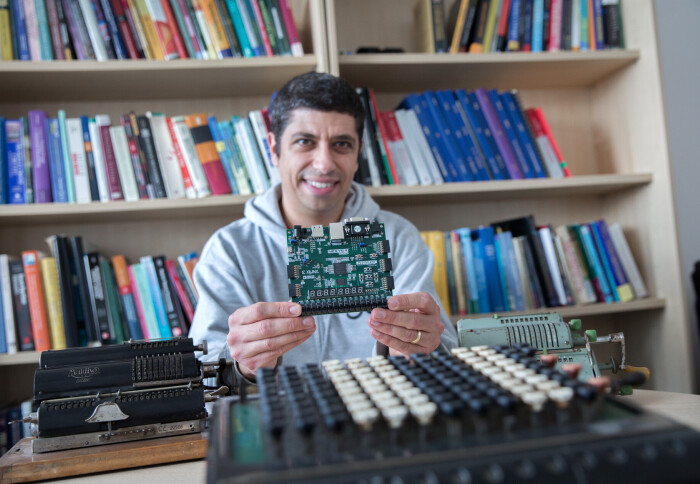Research with AMD to optimise computer hardware for AI

Imperial is working with the semiconductor company AMD to optimise computer processors for machine learning.
The rise of machine learning and its much lauded recent applications such as ChatGPT have been driven largely by the increased processing power of hardware available to developers today. However, with machine learning still in its ascendancy, processors in data centres and personal devices have not traditionally been designed with machine learning in mind. A new generation of hardware optimised for machine learning could further unlock the technology’s potential.
We may be able to train machine learning models on edge devices. This way, we can reduce reliance on data centres. Professor George Constantinides
Imperial researchers are collaborating with AMD, one of the world’s largest processor makers, to reimagine the algorithms and hardware for training machine learning models. Researchers are exploring new methods that can employ edge devices such as home computers, smartphones, and smart home devices, all while improving accuracy, efficiency, and sustainability of machine learning devices.
Balancing accuracy, efficiency, and sustainability
The challenge, according to lead researcher Professor George Constantinides in Imperial’s Department of Electronic and Electrical Engineering, is three-fold. First, accurately representing real numbers for computations, one of the fundamental challenges of processor design. This leads to the second and third challenges—computing efficiently and sustainably.
Currently, computers are constrained to using approximations for real numbers due to their inability to process potentially infinite strings of digits. Therefore, Professor Constantinides and team are working to design powerful digital number systems tailored to the processing involved in machine learning that must also maximise energy efficiency and speed, all while maintaining an acceptable level of accuracy.
“How you define speed and energy efficiency tends not to be application-dependent, but accuracy definitely is,” said Professor Constantinides. “Defining accuracy for each use case is critical.”
With data centres already accounting for an estimated 4% of greenhouse gas emissions worldwide and rising, Imperial and AMD are devising a new system for training machine learning models.
“The training of models, like those deployed on edge devices such as laptops, requires powerful servers with high processing power and energy demands,” says Professor Constantinides. “So, to avoid placing data centres next to hydroelectric dams, with the right innovations, we may be able to carry out machine learning on smaller scales by training models on edge devices themselves. This way, we can reduce reliance on data centres in the cloud.”
Coalescing industry partners
The companies we work with benefit from Imperial’s ability to coalesce networks of business partners from across a supply chain to tackle problems in tandem Dr Jing Pang Acting Director of Industry Partnerships and Commercialisation (Engineering)
The research with AMD is the latest work by Professor Constantinides and his team to optimise processor architecture for a range of software applications. His group works closely with several industrial partners from the semiconductor industry, which also include ARM, Intel and Imagination Technologies.
“I’m very proud of our work with AMD, who I thank for lending their expertise as a leading industrial innovator,” said Dr Jing Pang, Acting Director of Industry Partnerships and Commercialisation in Imperial’s Faculty of Engineering. “Our partners in the semiconductor industry benefit not only from specialist expertise of Professor Constantinides and other top academics and researchers, but more broadly from their ability, characteristic of academic thinking, to span multiple layers of abstraction – from materials science at the bottom, through to circuit design, and then on to processor architecture nearer the top.”
Partnerships between Imperial and industry partners are facilitated by the College’s dedicated Enterprise team. Dr Pang added: “The companies we work with also benefit from Imperial’s ability to coalesce networks of business partners from across a supply chain to tackle problems in tandem, backed by the highly supported access to the College’s innovation ecosystem on offer through Imperial Enterprise.”
Article text (excluding photos or graphics) © Imperial College London.
Photos and graphics subject to third party copyright used with permission or © Imperial College London.
Reporter
David Silverman
Communications Division